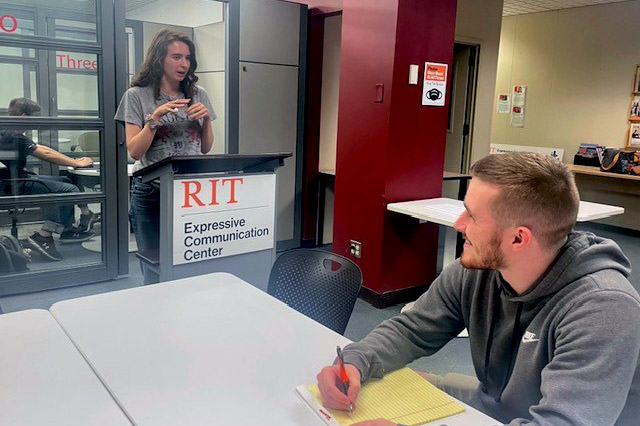RIT’s College of Liberal Arts receives grant to enhance philosophy and communication offerings
Grant will support curricula focused on expressive and analytic communication skills
provided photo
Kaatje Mayer, left, a third-year communication student, and Kyle James, a fourth-year game design student, work in the Expressive Communication Center. New and revamped philosophy and communication curricula will increase exposure to communication resources on campus.
RIT’s College of Liberal Arts plans to introduce new and revamped philosophy and communication curricula to help students across the university enhance their expressive and analytic communication skills. This was made possible by a $350,000 grant from the National Endowment for the Humanities and The Teagle Foundation. The grant supports the development of new curricula, courses, and a certificate in Expressive and Analytic Communication.
Driven by observations from RIT faculty, the goal of this grant project is to satisfy students’ career-related needs while also equipping them to be civically engaged, empathically attentive thinkers. The work will result in new and revamped humanities education that focuses on civic engagement, diverse perspectives, and ethical and moral reasoning, and utilizes “transformative” texts to prompt critical thinking and expression.
Kelly Norris Martin, associate dean of the College of Liberal Arts, and Katie Terezakis, professor in the Department of Philosophy, are co-principal investigators for the grant. They’ve worked with each other, and other RIT faculty and staff, to identify the most pressing needs in terms of general education for students.
“When Kelly and I discussed what was most lasting from our time as university students, and what we thought our students benefited most from, we came up with a description of a kind of ideal college experience. That experience, we found, pivots on learning to be mindful, confident communicators, and shrewd analysts of the world that confronts us daily,” said Terezakis.
Martin, Terezakis, and other involved faculty are currently working to create new general education courses, review existing courses at both general and upper levels, and integrate the identified analytic and communication skills and tools into each affected course. For example, Matthew Houdek, lecturer in the University Writing Program, redesigned the course Writing, Public Speaking, and Civic Engagement to center on the insights and transformative texts supported by this project, and it will be offered in spring 2023.
The group is also developing a certificate in Expressive and Analytic Communication. The new courses will be available in fall 2023, and some of the revamped curricula is already being implemented in current courses. Details about the certificate are still being finalized.
These changes to curricula and introduction of new analytic and communication skills and tools is in direct response to feedback the team collected from faculty across the university regarding what they believed students most lacked, and required, in general education courses. Most of the courses, like Houdek’s redesigned course, will also allow students to fulfill writing and discussion intensive requirements.
“Communication instruction is critically important for all disciplines as employers do expect employees to be effective communicators. In fact, current studies have shown that communication plays a central role in the ability to become an influential member of the STEM community and a necessary skill for innovation and leadership,” said Martin.
Martin and Terezakis explain that exposure to “transformative” texts—which they define as literature and media that focus on using expression to transform yourself and transform the world—is key to student success in communicating their own thoughts and ideas. The texts will challenge students to truly engage with the issues presented, while also functioning as an example of strong critical and expressive communication. Some examples of these texts include “What to the Slave is the Fourth of July?” by Frederick Douglass, “Strike Against War” by Helen Keller, “The Symposium” by Plato, and “Ain't I a Woman?” by Sojourner Truth.
“Typically, when students have the opportunity to have these deeper discussions with transformative texts and the opportunity to work one-on-one with another student on a communication challenge, they are really inspired,” said Martin. “And inspiring students who engage with their coursework is a really rewarding experience for any instructor.”
The grant work has three guiding targets for implementing expressive and analytic communication curricula. First is to give non-humanities majors more opportunities to immerse themselves in a genuine humanities environment. Second is to create curricular pathways for non-humanities majors to double-major in a humanities discipline in a way that bolsters their education without costing them more time or money. The final target is to create new opportunities for students to major or minor in a humanities discipline, or to earn a certificate.
“When we applied for this grant, we knew that what we were proposing could work—and we knew from experience that RIT students would thrive in an enriched humanities environment—but we didn’t know if anyone would be willing to take a chance on our curricular proposal by funding it. We’ve been extremely gratified to receive not only the support of the NEH and the Teagle Foundation, but internally within RIT, many individuals and offices have come together to help enact our enhanced curricula,” said Terezakis.
The core advisory faculty who have contributed to revising and developing curriculum include: Keri Barone, principal lecturer; Makini Beck, assistant professor; Kari Cameron, senior lecturer and advertising and public relations program director; Rebecca DeRoo, associate professor and visual culture program director; Nickesia Gordon, associate professor; Matthew Houdek, lecturer; Irina Mikhalevich, assistant professor; Elizabeth Reeves O'Connor, principal lecturer and director of the Expressive Communication Center; Wade Robison, Ezra A. Hale Professor in Applied Ethics; and Lawrence Torcello, associate professor.
Leah Bradley, interim director of the Office of Educational Effectiveness Assessment, serves as the group’s assessment partner.
For more information about this grant work, or to learn how to get involved, contact Martin at kelly.martin@rit.edu or Terezakis at terezak@rit.edu.



